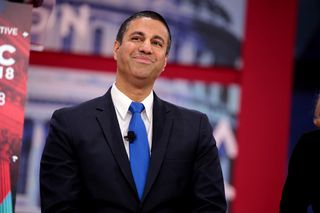Ajit Pai doubles down on stance that states can’t enact net neutrality rules
FCC argues it can (and does) preempt state net neutrality regulations.

When the FCC voted 3-2 to roll back net neutrality rules implemented during the previous administration, it also asserted that its regulations—known as the Open Internet Order—"preempt any state or local requirements that are inconsistent" with the rules reversal. Essentially, the FCC anticipated that states might try to enact their own net neutrality rules. It was right, as several states have done exactly that. Following a recent court ruling in Minnesota, however, FCC chairman Ajit Pai reiterated that states must bow to federal law on this issue.
While far from the final word, Pai used the opportunity to hammer home the FCC's stance. In this case, the ruling found that Minnesota's state government does not have the authority to regulate voice-over-IP (VoIP) phone services offered by Charter and other ISPs, Arstechnica reports. According to the court ruling, VoIP is an "information service" under federal law.
"Federal law for decades has recognized that states may not regulate information services," Pai said (PDF). "The 8th Circuit's decision is important for reaffirming that well-established principle: '[A]ny state regulation of an information service conflicts with the federal policy of non-regulation' and is therefore preempted."
There's much more to this specific case, though as it applies to net neutrality and the fight to restore it, the bottom line is a court has now reaffirmed the FCC's stance. The larger implication is that states may have a tough time convincing the court system that they are empowered to issue their own net neutrality regulations.
That won't stop states from trying. California is in the process of enacting what are considered the strongest set of net neutrality rules in the nation. The bill recently passed a state Assembly vote (61-18) and was then approved in the Senate (27-12). All that waits now is the governor's approval.
Should the bill become law, it could serve as a framework for other states to follow. Whether it holds up to legal scrutiny, however, remains to be seen.
The biggest gaming news, reviews and hardware deals
Keep up to date with the most important stories and the best deals, as picked by the PC Gamer team.
Paul has been playing PC games and raking his knuckles on computer hardware since the Commodore 64. He does not have any tattoos, but thinks it would be cool to get one that reads LOAD"*",8,1. In his off time, he rides motorcycles and wrestles alligators (only one of those is true).
Most Popular





